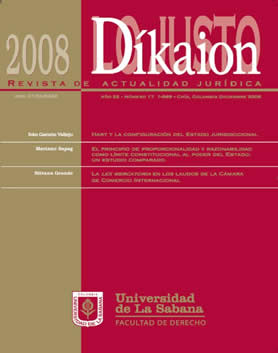El principio de proporcionalidad y razonabilidad como límite constitucional de poder al Estado: un estudio comparado
Keywords:
Constitutional oversight, principle of proportionality, reasonableness.Abstract
The analysis of the constitutional validity of a rule cannot be limited to a mere compliance of the adjective or procedural due process requirements; it is also necessary a substantive due process analysis of reasonableness on the actual content of the rule: its means and purposes, and its respect for the constitutional and fundamental rights and freedoms. This work aims to outline the main aspects of the reasonableness principle, which is known as well as the principle of proportionality or as the substantive due process, and the guidelines and rules for a proper implementation. The principle is approached in this work by a comparative study of its performance in the United States legal system, Europe and Argentina. Moreover, the reasonableness maxim cannot be analyzed without reference to the question of the interpretation of fundamental rights. For this reason, this topic is reviewed, also, from the perspective of the jurisprudence and the constitutional doctrine in the different legal systems.
Downloads
Downloads
How to Cite
Issue
Section
License
1. Proposed Policy for Journals That Offer Open Access
Authors who publish with this journal agree to the following terms:
This journal and its papers are published with the Creative Commons License Attribution-NonCommercial-NoDerivatives 4.0 International (CC BY-NC-ND 4.0). You are free to share copy and redistribute the material in any medium or format if you: give appropriate credit, provide a link to the license, and indicate if changes were made; don’t use our material for commercial purposes; don’t remix, transform, or build upon the material.






